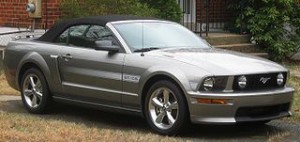
The recall of older model Ford Mustangs was expanded to include over half a million vehicles suspected of having faulty passenger-side Takata-made airbags. Last month Ford was one of five car manufacturers asked by the US regulatory agency the National Highway Traffic Safety Administration to enlarge the recall of cars with potentially defective airbags to beyond the limits of areas with high humidity.
Takata had warned that there was a possibility that inflators of the airbags could malfunction when exposed to high humidity for prolonged periods of time. They expressed concern that the malfunction could cause potentially deadly metal shrapnel to be shot out at passengers upon inflation of the airbags.
Before the expanded recall Ford had already recalled about 55,000 vehicles with problematic airbags. The NHTSA asked for the expanded recall when it learned that there were reports of airbag malfunctions outside the limited high-humidity areas. Driver-side airbag inflator events have been connected to at least five fatalities, none in Ford-made cars. Ford stated that it knew of one accident with an injury which might be linked to an airbag defect.
The recall includes 500,439 Mustangs from model years 2005-2008 and 2,050 of 2005 and 2006 niche two-seat sports car Ford GT.
